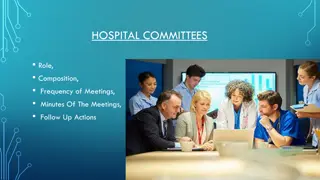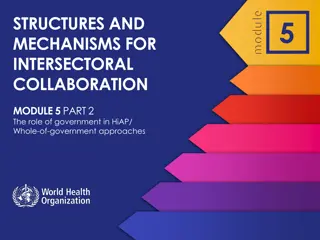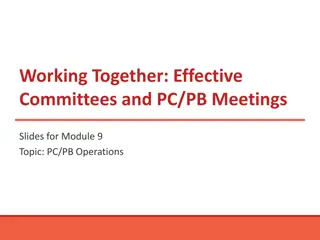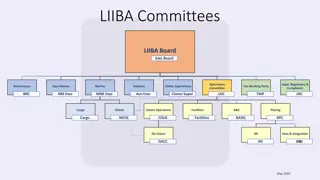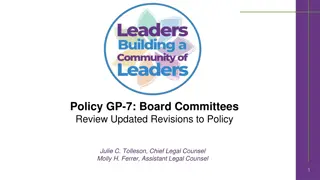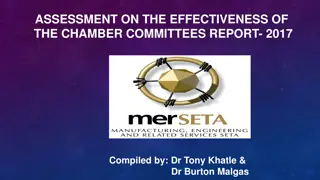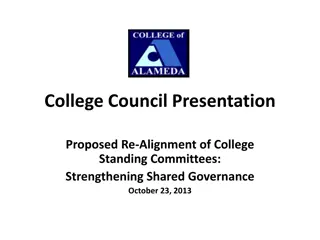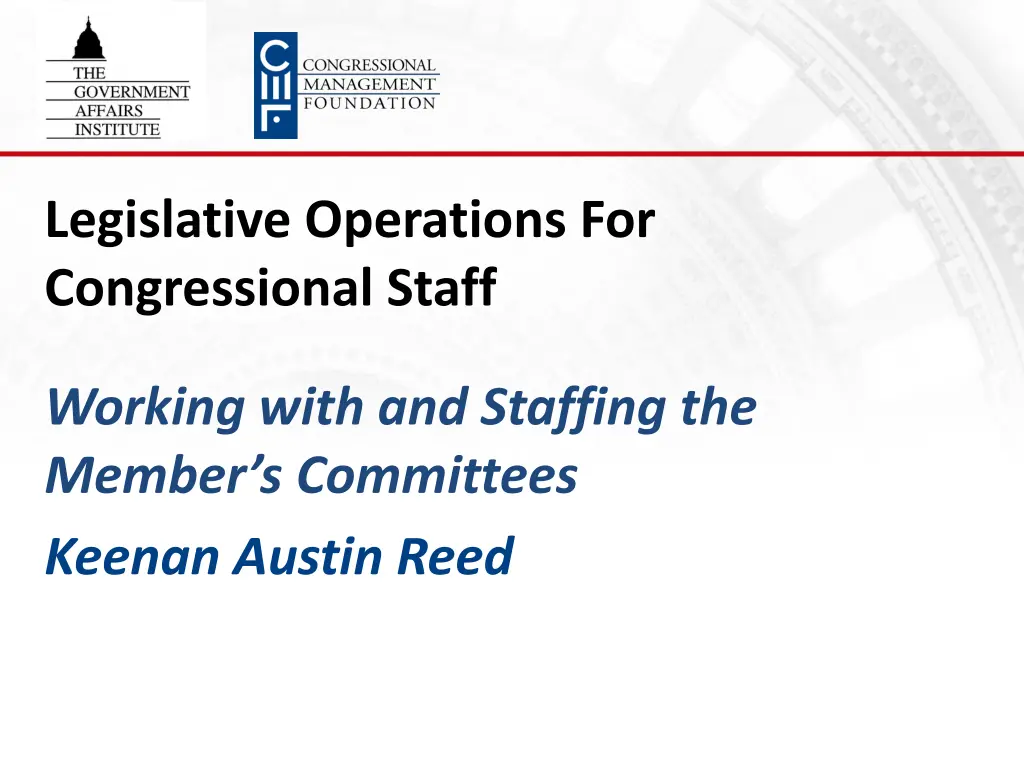
Congressional Staff: Committee Operations & Member Support
Gain insights into legislative operations and committee functions for congressional staff. Learn how to prepare members for hearings, avoid committee pitfalls, and meet member preferences effectively. Dive into resources for committee hearings, witness preparation, and successful engagement with lobbyists and policy experts.
Uploaded on | 2 Views
Download Presentation

Please find below an Image/Link to download the presentation.
The content on the website is provided AS IS for your information and personal use only. It may not be sold, licensed, or shared on other websites without obtaining consent from the author. If you encounter any issues during the download, it is possible that the publisher has removed the file from their server.
You are allowed to download the files provided on this website for personal or commercial use, subject to the condition that they are used lawfully. All files are the property of their respective owners.
The content on the website is provided AS IS for your information and personal use only. It may not be sold, licensed, or shared on other websites without obtaining consent from the author.
E N D
Presentation Transcript
Legislative Operations For Congressional Staff Working with and Staffing the Member s Committees Keenan Austin Reed
Overview of Class Functions of Committees Preparing Your Member for Hearings and Markups Developing Impactful Opening Statements Preparing Witness Questions Offering Amendments Must-Know Procedural Rules Advancing Legislative Priorities with Committees
Functions of Committees and Their Staff Legislate Investigate
Committee Pitfalls Things To Avoid What are areas that can bring unwanted attention to your boss? What is the expression you don t want to see from the Chairman/Ranking Member of a committee on which your boss serves?
Preparing the Member: Committee Hearing Resources for Learning the Issue - Committee Staff Memorandum - Witness Testimony - Consulting with Outside Experts TIP Use Lobbyists for intel/info TIP Use Think Tanks for policy - Congressional Research Service - Reach out to Congressional district - Legislative Hearing -- Section-by-Section Summary/CBO Score - Talk to federal departments/agencies
Pre-Hearing Preparation continued Hearing Packet for Member - Committee memo - Personal office memo Incorporate personal views of member/district perspective - Witness testimony - Opening Statement - Questions for witnesses
Know Your Members Preferences What font size does your Member prefer? Does your Member like numbers or bullets? Does your Member like scripted paragraphs? Does your Member prefer a general outline? Is your boss asking you the same questions about your memos which can imply you are not providing information the Member wants to see each time?
Impactful Opening Statements Thank the Chair or sponsor of bill Broad statements versus focusing on specific issue/policy area Personalize statement/tell a story Make it district-focused Tip Mention constituents/district Work with your press secretary and communications director
WitnessQuestions Prepare a variety of questions - Provide background/context - Group by subject area - Questions for both friendly versus unfriendly witnesses Work with Committee Staff on line of questions - Will questions be coordinated? Friendly witness/unfriendly witness - Make a point/advance a policy or position - Get them on record - Cite fact by some other expert that contradicts witness
Preparing Member: Committee Markup Information for Member - Bill language and section-by-section summary - Committee staff memorandum - List of amendments Chair often shares with Committee Members in advance Staff recommendations/position of Committee and Subcommittee Chair or Ranking Member - Prepare statements on bill or amendments Tip Determine constituent interest regarding bill/amendments and think through political implications Pre-markup Committee meetings for Members and staff
Amendments Your Member wants to offer amendment - Always talk to Chairman s or ranking member s staff as early as possible - Chair may want to minimize # of amendments/incorporate in manager s amendment - Member-to-member communication? Tip committee markup - Work with Office of Legislative Counsel - Share with other offices Voting on other Members amendments - Prepare pros and cons for Member Some committees only allow amend at full
3 Must-Know Procedural Issues Overall Rules Governing Committee Markup - Markup process in House committees reflects many of the rules and practices that govern the amending process on the House floor - House rules also empower each standing committee to supplement these by adopting its own written rules, which each committee does at the beginning of each Congress
Procedural Issue Debating Amendments Offering and Debating Amendments - Resembles rules in Committee of the Whole on House floor. - Members offer their amendments to each section of the bill in sequence unless agreed otherwise by UC - Each amendment is debated under the 5-minute rule - Amendment sponsor recognized first by chair, then member opposed - Another member may ask speaker to yield - Speaker may yield if chooses .but it comes out of own time - Person yielding can reclaim time an any point
Procedural Issue - Germaneness Germaneness rule - Amendments must typically be germane to the text they propose to change -- amendment cannot change the subject under consideration - 3-part test: Must relate to the subject matter under consideration Fundamental purpose of amendment must be germane to fundamental purpose of bill Amendment must be within jurisdiction of committee
Working with Committee Staff Member s Legislative Priorities Share legislative language and objectives with Committee staff Letter to Chairman of Committee requesting hearing or markup and face-to-face meeting Tip offer field hearing option to Chairman Engage outside organizations to support bill Tip constituents of Chairman are effective champions
Advancing Members Legislative Priorities Show broad support Committee members as cosponsors! Endorsements from special interest groups representing constituencies back home. Importance of bipartisan support? Tip some committees require minimum number of cosponsors to move bill
Working with Staff of Committee on Which the Member Does Not Serve Top 6 Things You Can Do: 1. Show support from Committee members 2. Meet with Committee staff 3. Member communication to Committee chair 4. Testify at a Committee hearing 5. Sit on dais at Committee hearing 6. Get Leadership on your side
Questions? Keenan Austin Reed Keenan1.Austin@gmail.com



